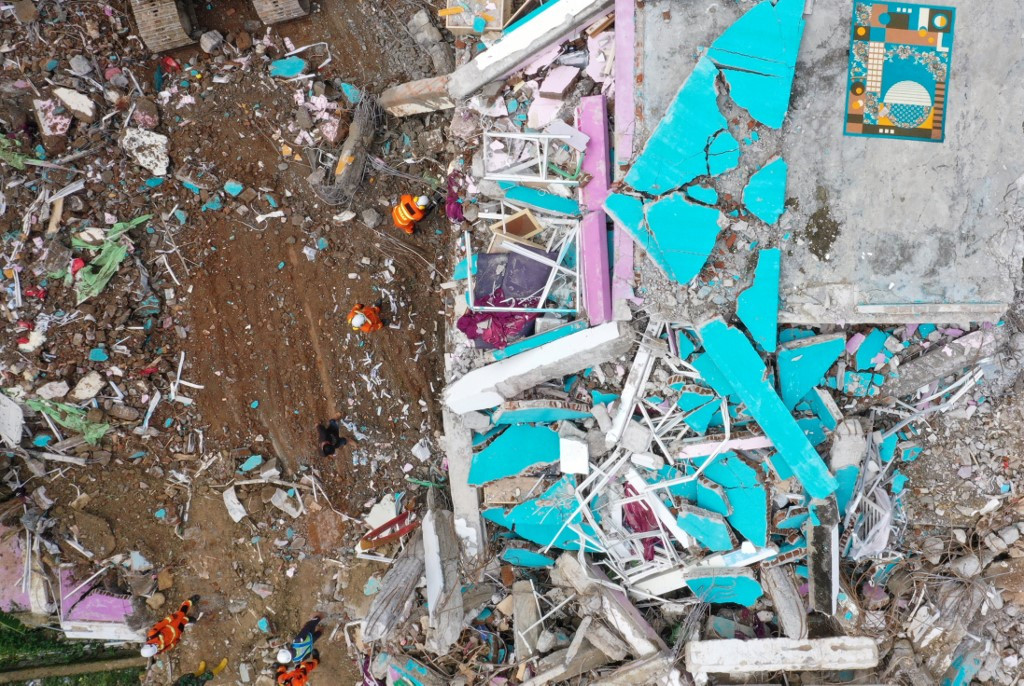Popular Reads
Top Results
Can't find what you're looking for?
View all search resultsPopular Reads
Top Results
Can't find what you're looking for?
View all search resultsDisaster-stricken regions step up virus countermeasures
Regional administrations are rolling out COVID-19 countermeasures, including testing and containment, in a number of disaster-stricken areas in an effort to avoid the additional burden of new infection clusters.
Change text size
Gift Premium Articles
to Anyone
T
he government is stepping up COVID-19 countermeasures in disaster-hit regions in an effort to prevent new infection clusters from emerging and compounding existing crises.
In West Sulawesi, which was struck by a series of high magnitude earthquakes last week, the Health Ministry has been testing displaced persons for the virus and grouping them based on their results.
“We are screening and testing evacuees, so in two days people who tested positive for COVID-19 will be separated from those who tested negative,” said the head of the ministry’s Health Crisis Center, Budi Sylviana, at a press conference this week.
He added that the ministry had dispatched contact tracing teams from Jakarta and Makassar to South Sulawesi to provide support at evacuation points in the province as a means of curbing possible transmission.
A mobile polymerase chain reaction (PCR) testing station would be brought in from Makassar, he said, enabling both antigen and PCR swab tests to be conducted on location in Mamuju, one of the regencies where the quake hit hardest.
The region was struck by a 5.9 magnitude earthquake on Thursday, and an even stronger 6.2 magnitude seismic shock followed the morning after, just as a search and rescue teams were mobilizing to locate survivors.
According to data from the National Disaster Mitigation Agency (BNPB), at least 15,014 people in Mamuju and 4,421 people in Majene regency were displaced by the West Sulawesi earthquake.
At least 90 people have died, the National Search and Rescue Agency (Basarnas) has announced.
The tremors are part of a series of natural disasters that have occurred across the archipelago as the country begins a mass vaccination campaign to curb the spread of COVID-19.
Authorities have accepted that screening and testing for the virus will be part of Indonesia’s disaster mitigation efforts.
National COVID-19 task force spokesperson Wiku Adisasmito said the government would conduct both antigen and PCR swab tests on everyone displaced by the West Sulawesi earthquake and other natural disasters.
“The task force and regional administrations [in affected areas] will conduct testing as a preventive measure. As we’re still facing the pandemic, this is an important part of mitigation efforts to prevent a double burden,” Wiku told The Jakarta Post on Wednesday.
The spokesman said regional governments were expected to include screening and testing as part of their disaster mitigation efforts but that they would be able to request additional support if the level of testing did not suffice.
The South Kalimantan provincial administration declared a state of emergency last Thursday in response to massive flooding in at least seven regencies that had affected nearly 350,000 people.
Some 63,600 people were evacuated to the 1,400 evacuation tents pitched in the province.
The local administration was not planning to test evacuees for the virus, but South Kalimantan’s 101/Antasari Military Region commander (Danrem), Col. Inf. Fimansyah, said they had been grouped in a way that sought to prevent the spread of COVID-19.
“In terms of health protocols, we have followed the BNPB’s guidance by grouping evacuees by gender and age so that elderly people or people with underlying conditions won’t be easily exposed,” he said at a virtual press conference hosted by the BNPB on Wednesday.
In South Tugu village in Bogor regency, West Java, at least 900 people were affected by a flash flood on Tuesday morning. The residents fled to their relatives’ homes or to a guest house owned by PT Perkebunan Nusantara VIII.
The BNPB has advised residents to remain on alert as the Meteorology, Climatology and Geophysics Agency (BMKG) has forecast that the peak of the rainy season will last until the end of February.
From Jan. 1 to Jan. 18, the BNPB recorded 154 natural disasters in the country.
The COVID-19 task force has also advised increased caution to limit transmission of the virus, which could become an additional burden in disaster-hit areas.
Airlangga University epidemiologist Laura Navika Yamani stressed the importance of screening and testing evacuees to anticipate mass exposure to the coronavirus, saying that between the time of a disaster and the arrival of assistance, people usually clustered in groups at evacuation sites or while in search of supplies.
“It is alarming that there is a risk of transmission [in disaster-stricken areas]. We need COVID-19 testing to map its spread,” Laura told the Post this week.
She urged the government to set up isolation tents specifically for evacuees with the virus, as well as other relevant healthcare facilities.










